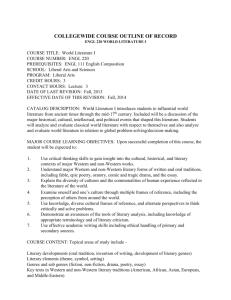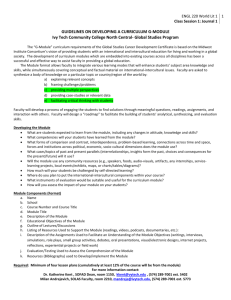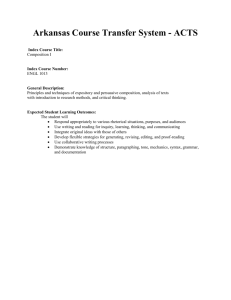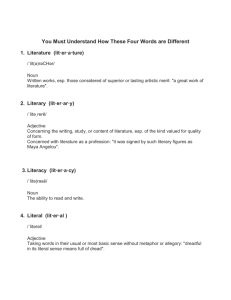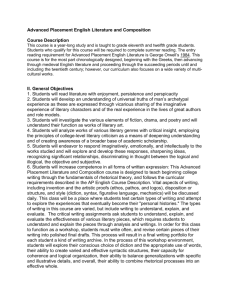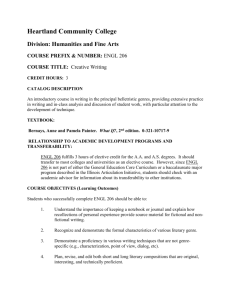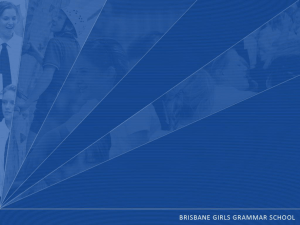ENG 220.CS 9-11-Guidlines on Developing Global Curriculum
advertisement
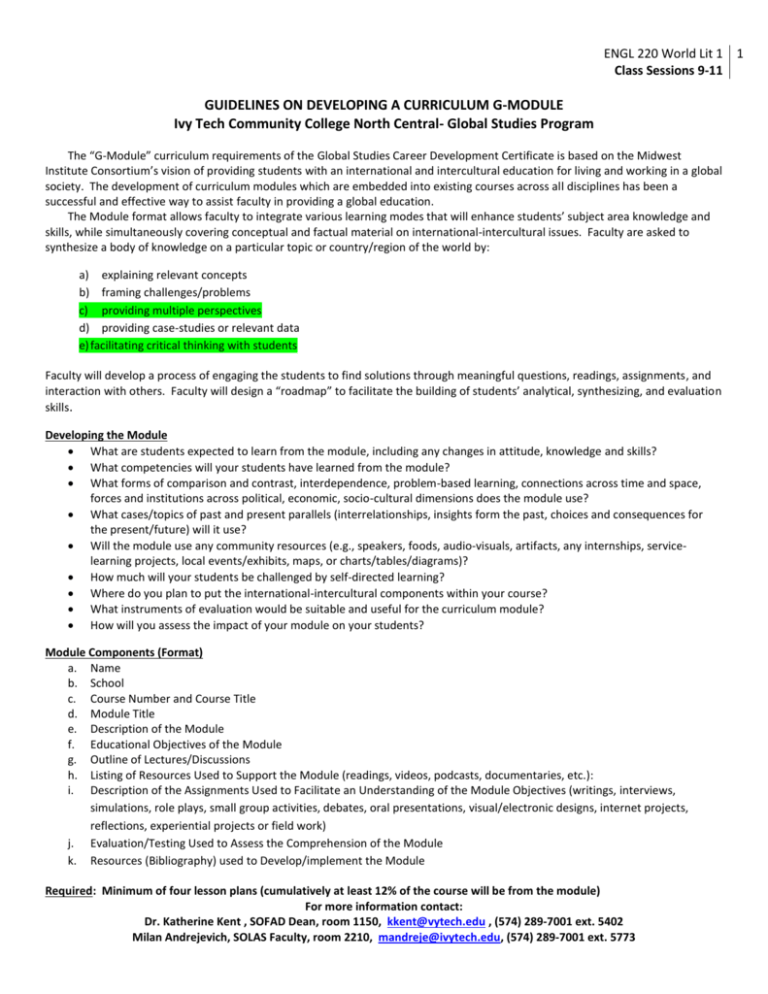
ENGL 220 World Lit 1 1 Class Sessions 9-11 GUIDELINES ON DEVELOPING A CURRICULUM G-MODULE Ivy Tech Community College North Central- Global Studies Program The “G-Module” curriculum requirements of the Global Studies Career Development Certificate is based on the Midwest Institute Consortium’s vision of providing students with an international and intercultural education for living and working in a global society. The development of curriculum modules which are embedded into existing courses across all disciplines has been a successful and effective way to assist faculty in providing a global education. The Module format allows faculty to integrate various learning modes that will enhance students’ subject area knowledge and skills, while simultaneously covering conceptual and factual material on international-intercultural issues. Faculty are asked to synthesize a body of knowledge on a particular topic or country/region of the world by: a) explaining relevant concepts b) framing challenges/problems c) providing multiple perspectives d) providing case-studies or relevant data e) facilitating critical thinking with students Faculty will develop a process of engaging the students to find solutions through meaningful questions, readings, assignments, and interaction with others. Faculty will design a “roadmap” to facilitate the building of students’ analytical, synthesizing, and evaluation skills. Developing the Module What are students expected to learn from the module, including any changes in attitude, knowledge and skills? What competencies will your students have learned from the module? What forms of comparison and contrast, interdependence, problem-based learning, connections across time and space, forces and institutions across political, economic, socio-cultural dimensions does the module use? What cases/topics of past and present parallels (interrelationships, insights form the past, choices and consequences for the present/future) will it use? Will the module use any community resources (e.g., speakers, foods, audio-visuals, artifacts, any internships, servicelearning projects, local events/exhibits, maps, or charts/tables/diagrams)? How much will your students be challenged by self-directed learning? Where do you plan to put the international-intercultural components within your course? What instruments of evaluation would be suitable and useful for the curriculum module? How will you assess the impact of your module on your students? Module Components (Format) a. Name b. School c. Course Number and Course Title d. Module Title e. Description of the Module f. Educational Objectives of the Module g. Outline of Lectures/Discussions h. Listing of Resources Used to Support the Module (readings, videos, podcasts, documentaries, etc.): i. Description of the Assignments Used to Facilitate an Understanding of the Module Objectives (writings, interviews, simulations, role plays, small group activities, debates, oral presentations, visual/electronic designs, internet projects, reflections, experiential projects or field work) j. Evaluation/Testing Used to Assess the Comprehension of the Module k. Resources (Bibliography) used to Develop/implement the Module Required: Minimum of four lesson plans (cumulatively at least 12% of the course will be from the module) For more information contact: Dr. Katherine Kent , SOFAD Dean, room 1150, kkent@vytech.edu , (574) 289-7001 ext. 5402 Milan Andrejevich, SOLAS Faculty, room 2210, mandreje@ivytech.edu, (574) 289-7001 ext. 5773 ENGL 220 World Lit 1 2 Class Sessions 9-11 GLOBAL STUDIES MODULE FORMAT Ivy Tech Community College North Central- Global Studies Program Name: Maribeth Anderson School: Ivy Tech Community College of Indiana Course Number and Title: World Literature I CATALOG DESCRIPTION: World Literature I introduces students to influential world literature from ancient times through the mid-17th century. Included will be a discussion of the major historical, cultural, intellectual, and political events that shaped this literature. Students will analyze and evaluate classical world literature with respect to themselves and also analyze and evaluate world literature in relation to global contexts. Module Title: Medieval Chinese Literature Description of the Module: Course Learning Objectives: 1. Use critical thinking skills to gain insight into the cultural, historical, and literary contexts of major Western and Non-Western works. 2. Explain the diversity of cultures and the commonalities of human experience reflected in the literature of the world. 3. Examine oneself and one’s culture through multiple frames of literary reference, including the perception of others from around the world. 4. Demonstrate an awareness of the tools of literary analysis, including knowledge of appropriate terminology and of literary criticism. 5. Use effective writing skills including ethical handling of primary and secondary sources. Educational Objectives of the Module (should constitute a minimum of 12% of the course): By the end of this session, you will be able to: demonstrate comparative, analytical, and synthesizing skills using multimedia; demonstrate some awareness of medieval Chinese literature; reflect on cultural similarities and differences. Outline of Lectures/Discussions: Listing of Resources Used to Support the Module (readings, videos, podcasts, documentaries, etc.): Read: NAWL.B, pp. 969-987, 1001-1047, 1053-1068 Review: Lecture 2 (Class Session 1 folder) Fascinating YouTube video--a five-minute excerpt from a half-hour video with footage from the path traveled to Cold Mountain: http://www.youtube.com/watch?v=kIQC0p_xLFk. For more information on the video, you can go to The Center for International Education: http://www.thecie.org/. ENGL 220 World Lit 1 3 Class Sessions 9-11 Description of the Assignments Used to Facilitate an Understanding of the Module Objectives (writings, interviews, reflections, experiential projects or field work): Add: Project Project: Medieval Chinese Literature For this assignment, you are asked to create an artifact for a graduation portfolio, e.g. a portfolio that you would develop in your capstone course. An artifact is an object or thing; a portfolio is a collection of artifacts that the author selects to best represent his/her knowledge of specified learning outcomes. For this project, you will be evaluated on how well you demonstrate knowledge of the following: 1. Use critical thinking skills to gain insight into the cultural, historical, and literary contexts of major Western and non-Western works. 2. Explain the diversity of cultures and the commonalities of human experience reflected in the literature of the world. 3. Examine oneself and one’s culture through multiple frames of literary and artistic reference. 4. Demonstrate an awareness of the tools of literary analysis, including knowledge of appropriate terminology and of literary criticism. 5. Use effective academic writing skills including ethical handling of primary and secondary sources. For this project, you need to work with a tool new-to you. Select one of the following: Pixton.com—creates comics & graphic novels Animoto.com—creates videos Weebly.com—creates websites All of these websites offer free start-up packages; you do not need to purchase anything additional to complete this assignment. You may send the artifact, itself, or a link, via the assignment link in Class Session 13, but if you choose the latter, make sure the link works before submitting! You are further instructed to work with the reading materials assigned in Class Session 11: Medieval Chinese Literature: Hermits, Buddhists, & Daoists; Tang Poetry in creating your project. The other primary requirements for this assignment are as follows: 1) You must develop a logical argument; 2) you must integrate three reliable & credible external sources to support that argument and provide working links to those sources in the WC; and 3) you must work with one of the forms of literary criticism presented in Lecture 2. Please review the Project Grading Rubric and the Project Outline Template before beginning this assignment. Evaluation/Testing Used to Assess the Comprehension of the Module: Add Project Outline Template + Grading Rubric (see attachments) Resources (Bibliography) used to Develop/implement the Module: Norton Anthology of World Literature, 3rd ed., Vol A ENGL 220 World Lit 1 4 Class Sessions 9-11 Global Learning Integration Worksheet AACU Global Learning Value Rubric http://acu.org/resources/globallearning/index.cfm

